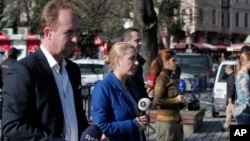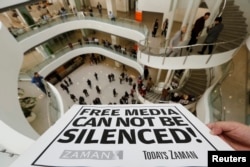The Turkish government has imposed what it called a "limited" media ban on news coverage following Tuesday's suicide bombing in Istanbul.
The ban was ordered by Turkey's Radio and Television Supreme Council and signed by Deputy Prime Minister Numan Kurtulmus. The government says the ban is "temporary."
"Preventing the public order from being very seriously undermined" was the reason written on the media blackout order.
Turkish journalists operate under some of the most restrictive media conditions in the world, media watchdog groups say. There has been a spike in prosecutions of journalists in Turkey, many charged with anti-terrorism offenses and under laws against insulting the president.
Last March, the Turkish government ordered a media ban after a hostage situation in an Istanbul courthouse. Another ban was ordered regarding the investigation of two blasts in Ankara in October.
The Turkish government also put a ban on news stories last year about a legislative panel's investigation of the four former ministers allegedly involved in corruption.
Gag order rules, critics
Ali Akel, a journalist-commentator, told VOA that this week's media gag order was intended to cover only camera and video recordings at the blast site.
"The Turkish government did not want blood and human remains from the scene to be broadcast" Akel said.
But Anadolu news agency reported the ban was far more sweeping and could impact news reports and analysis.
Most Turkish media covered Tuesday's bombing despite the government ban, and photos and video were streamed on social media by news outlets.
The opposition Republican People's Party leader, Kemal Kılıcdaroglu, chastised the Turkish ban in comments to members of his party.
"A suicide bomb explodes in a place like Istanbul, at the heart of tourism in Sultanahmet, and you have no measures taken," he said. "Then what do you do? You impose a ban on reporting even before ambulances arrive [on the scene]."





